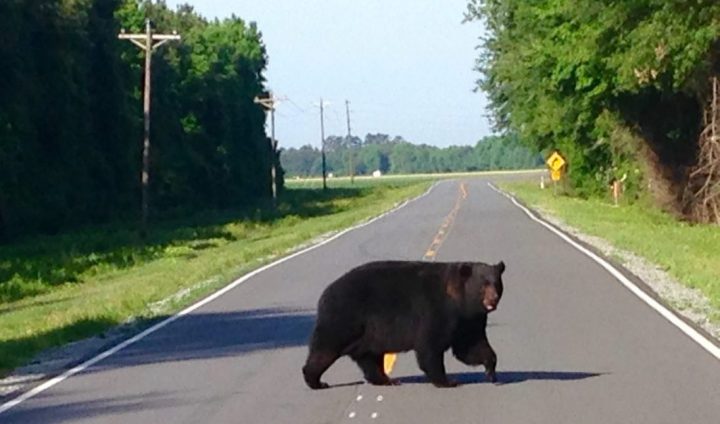
BEAUFORT – The recent spike in reports of black bear sightings in town and in other communities along North Carolina’s coast is not unusual, according to the state’s Wildlife Resources Commission.
Don’t be alarmed when you see a black bear. Black bears are not inherently dangerous and rarely aggressive toward people, but precaution is advised to reduce potential conflicts, the state agency announced.
Supporter Spotlight
“Sometimes when a bear is sighted, crowds may gather. This seemingly harmless situation can become dangerous for both humans and bear,” said Ann May, the commission’s extension wildlife biologist. “But the best option is to stay away, not interfere and allow the bear to move out on its own.”
Christopher Kent, coastal regional wildlife biologist with the commission’s Division of Wildlife Management, explained that land development and increased human population often displaces wildlife.
If you find a bear near your home, Kent suggests letting it be.
“The best thing people can do is not to feed the bears, nor provide an easy food source such as unsecured trash cans, bird feeders, outdoor pet food, things of that nature. If someone should see the bear, don’t approach or harass it, just give it room and eventually it will find its way out of town.”
Many may be wondering why the recent surge in black bear sightings.
Supporter Spotlight
Tom Harrison, founder of the Bear-Ology black bear museum in Plymouth, and organizer of the North Carolina Black Bear Festival held June 2-4 in Plymouth, has been a keen observer, photographer and videographer of black bears for more than 25 years. He shared some insight into the patterns of North Carolina black bears.

Harrison explained that bears moving in, or more typically through, neighborhoods happens for a variety of reasons.
“If food is scarce, which is a rare phenomenon here in coastal Carolina, it can send bears foraging around homes and garbage cans. This sometimes happens in early spring before things begin to green up, or in the fall when bears are trying to put on extra weight to sustain them through the lean winter. But more often bear sightings in populated areas have to do with family issues.”
When bear cubs reach about 18 months, the mother leaves the cub so she can go mate and begin the process all over again. Eighteen-month-old female bears are allowed to stay near the mother to start their own families while male juvenile bears leave home and are expected to travel to a new area to begin a family.
“I refer to these young bears as orphans, which they are not, but they probably feel like orphans,” Harrison said. “Mom has left them and they don’t know why. Now they are left to figure things out on their own, which may mean passing through or exploring areas inhabited by humans.”
Harrison said another primary reason for increased sightings is that male bears travel during mating season looking for females.
Both behaviors take place at about the same time, Harrison added, because mating season is from mid-May to mid-July.
“So, male bears looking for love or 18-month-old bears searching for a new home are on the move during this time. Female bears are also more active during this time, but don’t travel as far as male bears.”
The bear population is also increasing, which is another reason there have been bear sightings, Harrison continued.
“We have a very healthy and growing black bear population that is literally colliding on our highways with a growing human population. It is an ugly side effect of having so many bears,” he said. “As a matter of fact, according to the North Carolina black bear biologist, Colleen Olfenbuttel, we have the highest black bear densities in the world here on the Albemarle/Pamlico Peninsula, with as many as four bears per square mile.”

What should residents do if they see a bear? Enjoy the moment, Harrison answered.
If a resident perceives a threat, they can notify the police, their state wildlife biologist or their local game warden.
“But a threat is very unlikely for a couple of reasons. First of all, black bears, unlike other bears species, have a prey mentality instead of a predator mentality. They fear humans. Secondly, our coastal black bears are probably one of the least carnivorous omnivores. Their primary source of animal protein comes from insects. In short, bears don’t want to eat you or your pet. They don’t typically go to the effort to run after food. But they are quick to run away from perceived danger. Bears are lazy. They are opportunists that will eat almost anything that doesn’t require much effort.”
The Wildlife Commission explains that most transient bears, if left alone, will find their way out of town quickly and back to their natural habitat. People are urged not to approach or follow bears, or put themselves between a bear and its possible escape route.
Bears are rarely relocated by the Wildlife Commission since doing so can be dangerous for humans and the bear, and is generally unsuccessful because relocated bears often return to where they were originally captured. Additionally, there are few remote areas remaining to relocate bears. Fortunately, most situations do not warrant trapping, as removing attractants and leaving the bear alone resolves many conflicts, according to the commission.
Avoid Bear Encounters
The Wildlife Commission cautions people to not feed bears, whether intentionally or inadvertently. Bears can become bold when they grow accustomed to feeding on pet food, garbage and birdseed.
The Wildlife Commission suggests residents do the following to avoid attracting bears:
- Secure bags of trash inside cans stored in a garage, basement or other secure area, and place the cans outside as late as possible on trash pick-up days, not the night before.
- Purchase bear-proof garbage cans or bear-proofing existing garbage containers with a secure latching system.
- Discontinue the feeding of wild birds during spring and summer, even with feeders advertised as “bear-proof.” Bears are still attracted to seed that spills on the ground.
- Avoid open and unattended outdoor pet food containers. If you must feed pets outdoors, make sure all food is consumed and empty bowls are promptly removed.
- Clean all food and grease from barbecue grills after each use. Bears are attracted to food odors.
“Black bears are magnificent animals that are fascinating to watch. Don’t approach them or corner them. Just watch from a safe distance and count yourself fortunate to have seen them,” Harrison said.







